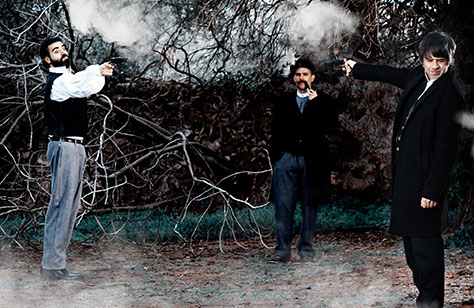Hey! Manchester promotes gigs by folk, Americana and experimental bands from around the world in Manchester, England. Read more here, see below for our latest shows, check out our previous shows, contact us, or join our mailing list, above.
When: 7.30pm on Tuesday 26 September 2023
Where: Gullivers, 109 Oldham Street, Manchester, M4 1LW
We’re delighted to welcome Guadalupe Plata back to Manchester – this time, to Gullivers!

2023 is the year of the return of Guadalupe Plata with their seventh studio album and a return to their original duo formation. Released in May on Everlasting Records, Guadalupe Plata is their first new album in four years. It was preceded by the single En Mi Tumba, which is intended as the epitaph of a knife fight victim whose grave is never visited. A soul in pain that has passed through the earth without pain or glory. Unusual chromatic notes for the group’s career coexist here with recognisable Gun Club hints on the slide.
Guadalupe Plata hail from Úbeda in Jaén, Spain, and comprise of Pedro de Dios Barceló and Carlos Jimena. As with their previous works, this new album does not have a title, but it does overflow with good music. Carlos explains the process: ‘The record was recorded in two different locations with the same sound studio project, based on a four-track Tascam 246 recorder with type II chrome cassettes, using 18 Tudor brand cassettes. All the recordings were made by the band in Úbeda, looking for new sounds with the freedom of having unlimited time to do it.’ They call this process the Estudio Ataúd (Coffin Studio). The digitisation, mixing and recording of the extra tracks was carried out in La Mina (Seville) in a joint production between Guadalupe Plata and Raúl Pérez where they finished adding both ‘dark saxes and eight-bit keyboards’.
The cinematographic representation of the desert is an influence on the instrumental passages of Guadalupe Plata. In these times when reality is stranger than fiction, the apocalyptic chromatic effects and crepuscular tones left in the Andalusian sky by the cloud of dust from the Sahara were the inspiration for Calima. The song took on a new life with the contribution of the sinuous winds of Matías Cordero, which also appear on Maleficio and Y.N.T.M.A (the latter an acronym for ‘Ya no tengo mi ataúd’ (I don’t have my coffin anymore), a title that was sinisterly suggested by the young son of an old friend).
La cigüeña is a cover of a song by Agapito Marazuela, guitarist and compiler of Spanish folklore from the last century, and tells the tale of a battle between a stork and a snake. The images and mysterious Andalusian details brought by the melody fit perfectly inside the universe of Guadalupe Plata, who display here their most characteristic drums, a percussion played with a bottle of anise that breathes fire, a guitar following one of the rumba rhythms created by Peret and, may Agapito forgive them, a voice with a vocoder effect.
Another resource on this record worth drawing attention to: Carlos uses a kerosene drum on Zapateado to pay tribute to Robert Belfour, one of the last great bluesmen whose footsteps the band literally tried to follow, unsuccessfully, during days spent playing in Clarksdale and Memphis invited by the Deep Blues Festival.
La Tía Tragantía is a tale from Andalusian oral tradition. A legend about the daughter of a king of Cazorla who ends up becoming a half-serpent, half-woman being that was told from generation to generation to scare children. In the context of this generational transmission we also have to understand El Cóndor Pasa, with a very strong traditional bond in their homes, it was the song with which Pedro’s father taught him to play the guitar. After the introduction, the speed of the tape was slowed down, giving rise to a chaotic effect created by chance – the second guitar was recorded with an amplifier whose batteries were about to run out. Yet another last nod to the roots of Guadalupe Plata is Stabat Mater, the hymn of the Cofradía de la Soledad, one of their favourites of Úbeda’s Holy Week.
Ruina tells the emotional ups and downs of a long night round between the Granada neighborhoods of Realejo and Sacromonte, in which a heart broken by mourning began to find relief.
In Al Infierno Que Vayas we find ourselves at a crossroad: the starting point is the lyrics of a flamenco falseta by Rafael Farina to which T-Model Ford style guitars are added as well as deconstructed drums and percussions which reminiscent of Captain Beefheart. All passed through the blender of the Úbeda musicians, for whom there is a clear parallel between the lyrics of flamenco and blues, ‘with a point of broken or crazy love stories, of not turning your back on pain, but facing it’.
The album cover, designed by Pedro, is a game board that unfolds on the back of a coiled snake with the added difficulty that all the squares lead to ruin. The photographs that come with the release, taken by Carlos, are inspired by The Duellists by Ridley Scott and serve to remind us that since their birth, 15 years ago, Guadalupe Plata had never entered a studio in their original duo format.
Local support comes from Ahmed & The Romans. The son of the Egyptian James Brown and three Italians pieced together from the bowels of the old empire. A real treat, a real sonic treat to bite into.
Attend on: Facebook
All shows are 18+ unless otherwise stated.
